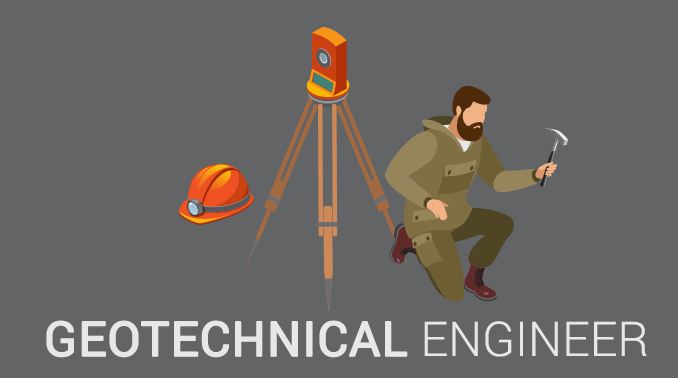What Does Geotheta Do?
Table of ContentsHow Geotheta can Save You Time, Stress, and Money.What Does Geotheta Mean?Geotheta Fundamentals ExplainedLittle Known Questions About Geotheta.An Unbiased View of Geotheta

With experience and a tried and tested record, you can advance to senior design functions, job management placements, or even start your very own working as a consultant. Continual expert advancement and remaining current with the most up to date sector patterns and modern technologies are essential for profession progression in this vibrant field. A profession in geotechnical engineering offers a diverse variety of projects and challenges, making certain that no 2 days are the same.
In the workplace, you will certainly analyze data, prepare reports, and collaborate with other experts - https://packersmovers.activeboard.com/t67151553/how-to-connect-canon-mg3620-printer-to-computer/?ts=1722609175&direction=prev&page=last#lastPostAnchor. Fieldwork involves website gos to, accumulating dirt samples, carrying out geotechnical examinations, and supervising construction tasks. Depending upon the task, you may work on-site in varying climate condition and take a trip to different locations within the UK. As a geotechnical engineer, your tasks might consist of website characterization, slope stablizing layout, foundation design, soil renovation techniques, and geotechnical instrumentation and surveillance.
The 6-Second Trick For Geotheta
You will also connect with clients, service providers, and governing authorities to deal with any kind of issues and make sure compliance with industry criteria and policies. Geotechnical design can be challenging, as it entails dealing with intricate dirt problems and resolving possible risks to human life and facilities. Nevertheless, efficiently addressing geotechnical problems and adding to the advancement of secure and lasting frameworks can be immensely rewarding.
If you're thinking about a profession in geotechnical design, here are some important pointers to assist you accomplish success: Networking is vital for job advancement in any type of field, and geotechnical design is no exemption. Signing up with professional associations, such as the Institution of Civil Designers (ICE) and the British Geotechnical Organization (BGA), can offer networking possibilities, accessibility to sector occasions and seminars, and valuable resources for professional advancement.

Developing strong interpersonal and monitoring skills will set you apart and open doors to career improvement chances - https://www.startus.cc/company/geotheta. Embarking on a job as a geotechnical designer in the UK provides amazing prospects and the chance to add to the development of the developed environment. By complying with the instructional pathways, acquiring essential licenses and certifications, and constantly sharpening your skills, you can develop an effective career in this dynamic area
The Best Strategy To Use For Geotheta
When a person asks what I do and I inform them that I am a geotechnical engineer, I typically get the follow-up question of, "What is that?" Geotechnical engineering is a specific branch of civil design that manages the scientific research of the technicians of soil and rock and its applications.
In this short article, I will talk about the role of geotechnical design and the sorts of troubles geotechnical designers address. Geotechnical engineers (geotechs) are associated with almost every kind of civil engineering task. Nevertheless, every framework is supported by dirt or rock unless it is floating, flying, or dropping.
Geotechs are generally most involved at the beginning of a project. A few of the tasks that a geotech might be in charge of are exploring subsurface problems, figuring out needed laboratory testing of soil and rock, analyzing the subsurface exploration outcomes, and creating reports that document the website conditions and provide referrals for structures, fill specs, slope security, etc.
Often, people do not intend to pay for geotechnical reports or design on smaller projects, yet the price of a consultant is usually more affordable than spending for substantial foundation repair work in the future. Geotechs are included in the layout of highway cuts and loads, shallow and deep foundations, planet preserving frameworks, embankments, tunnels, garbage dumps, dams, incline stablizing systems, and sidewalk subgrades.
Some Known Facts About Geotheta.

Frequently, things that might not seem vital become essential years later on when problems develop. Geo Tech Engineer. One last thing to bear in mind: geotechnical design is married to geology. Despite how terrific your design competence is, if something crucial is missed out on in the geologic characterization at a site, your competence might not save you
Vance, P.E., graduated from Marshall College with a Bachelor of Science in Engineering and obtained a Master of Scientific Research in Civil Engineering from the University of Illinois at Urbana-Champaign. He is currently pursuing a Ph. D. in Geological Design at Missouri College of Science and Technology. Jese functions as a geotechnical designer who specializes in geohazards.
The Buzz on Geotheta
Jese lives in West Virginia with his wife and child. He takes pleasure in creeping around on any type of landslide he can discover and hanging around fly fishing on the water. He can be found on LinkedIn. I hope you enjoyed this week's message by guest author Jese Vance. If you have an interest in your firm potentially signing up with the Civil Design Collective, please call us right here or call us at 800-920-4007.
Anthony Fasano, P.E.Engineering Administration Institute Author of Engineer YourOwn Success. Civil design is the specialist design discipline that deals with the design, building and construction and upkeep of public and personal framework within the native environment. Tailings Engineer Geotechnical design is a self-control within civil design that focuses on the behavior of natural geological materials in engineered systems. Geotechnical designers recognize that dirt and rock are the most inexpensive and most bountiful structure materials in the world, and subsequently play a significant duty in the building and construction and performance of every type of civil design structure.